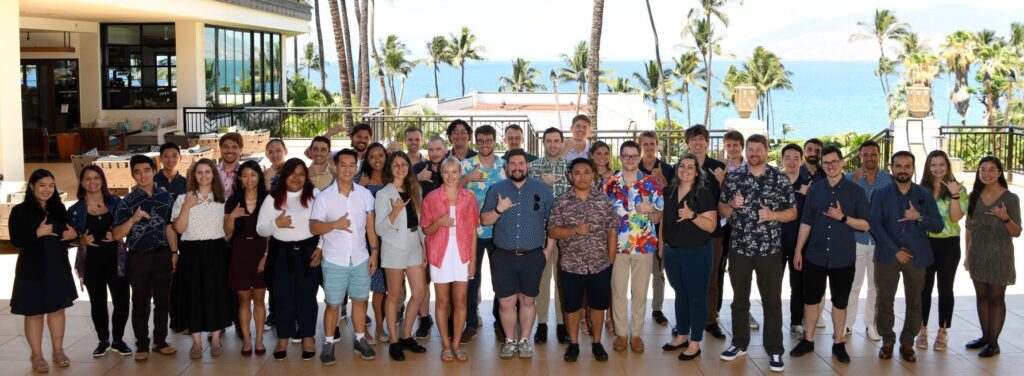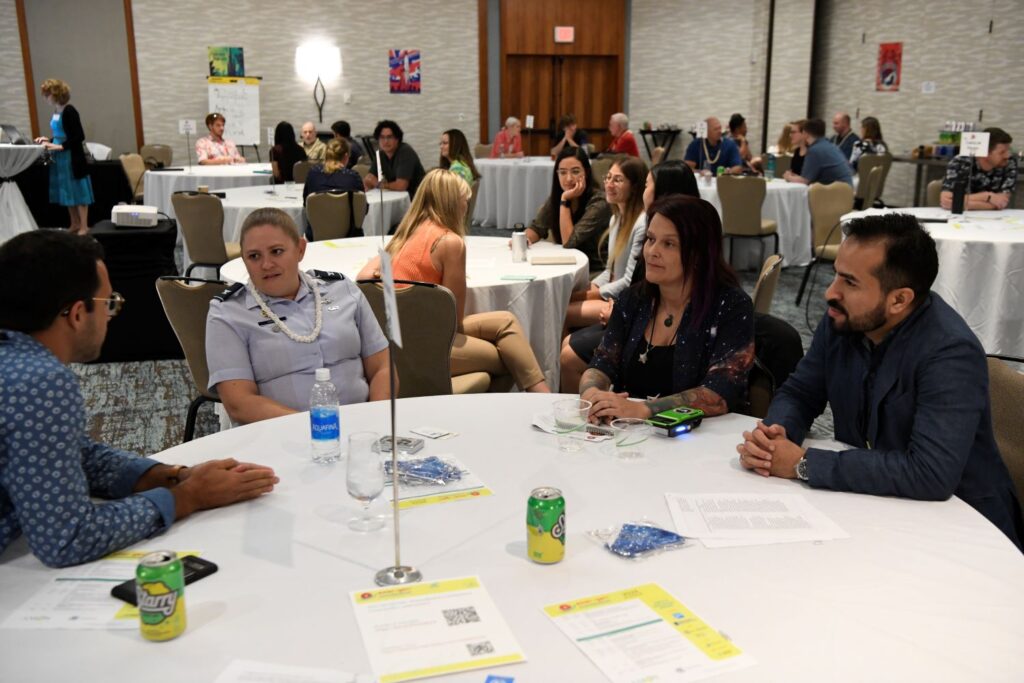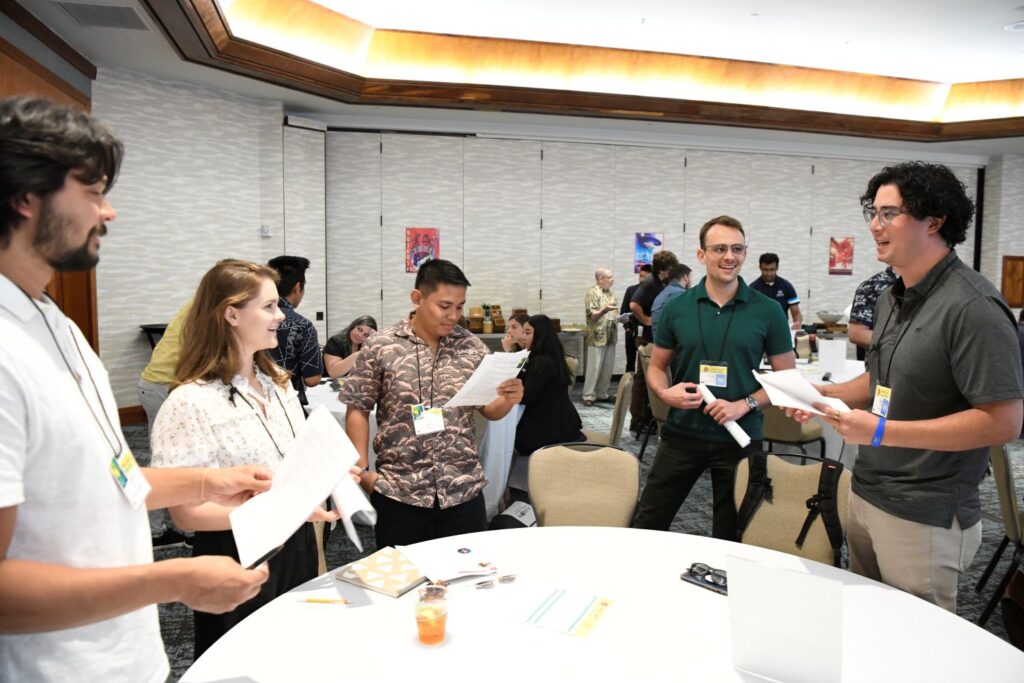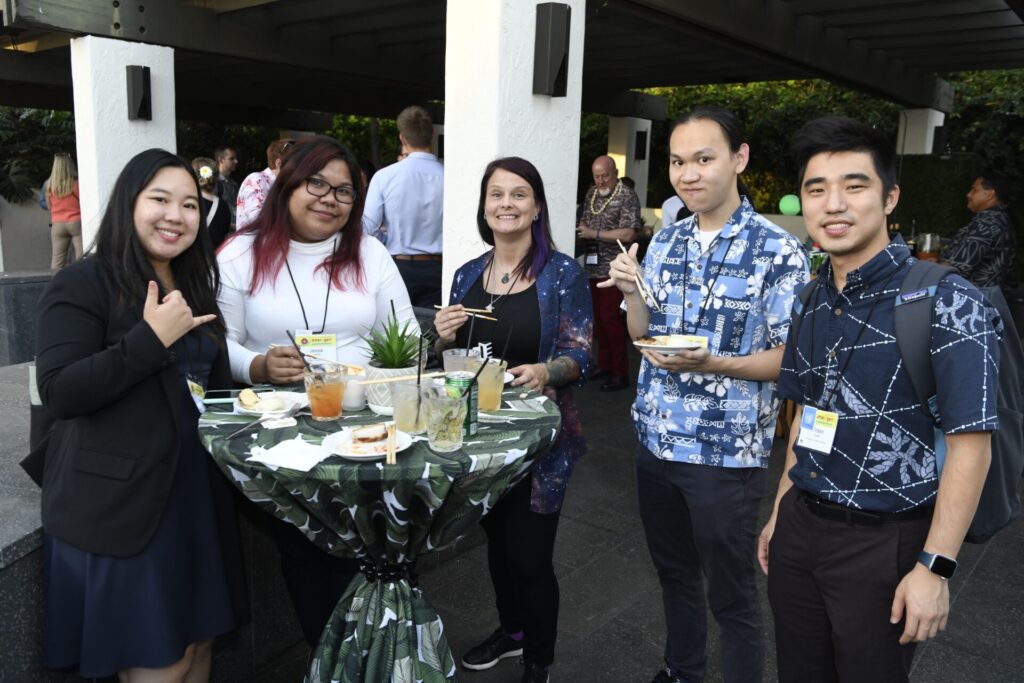Innovation, policy, career planning and more were all on the agenda for the 6th annual EMER-GEN® Program, held September 17-19 at the Wailea Beach Resort, Maui. A joint initiative of the AMOS Conference and the Space Generation Advisory Council (SGAC), the program presented by the Maui Economic Development Board (MEDB) was designed especially for young professionals and students enthusiastic about careers in space.
A cohort of 40, including 13 from Hawaii, participated in the 2023 program which began with a series of three pre-event webinars that helped to set up the main two-day event. Sessions included The Value of Aloha, Aerospace in Hawaii, Negotiation Skills, Mentoring, a Policy Game (for consensus building skills) and an Innovation Challenge. Working in teams, participants were challenged to find innovative ways to make space safer to operate in, and more sustainable for long-term use.
“One of the program’s strengths is its interactive nature,” said Annette Lynch, Director of Communications with MEDB and manager of the EMER-GEN Program. “Participants engage in lively discussions, brainstorming sessions, and networking opportunities that foster collaboration, the exchange of innovative ideas and develop leadership skills.”
A planning committee consisting of three young professionals helped the MEDB organizers shape the program. Two representatives nominated by SGAC, Kristin Shahady, Astroscale; and José Ferreira, a Ph.D. student at Department of Astronautical Engineering, University of Southern California; were joined by EMER-GEN Alum and Maui resident, Yosef Ben Gershom, of Hawaii Space Flight Laboratory, University of Hawaii.

Guest Speakers
The EMER-GEN Program began on Day 1 with a cultural opening and a presentation by Kumu Hula (Master Hula Teacher) Luana Kawa‘a. The owner of The Hawaiian Learning Center, and creator of the Morning Manaʻo Podcast gave a workshop of ‘The Value of Aloha.’
“We learned about the different meanings, and that it’s a set of values. It’s like this community here,” said Ben Gershom relating to the AMOS community. “We all come from different backgrounds, different interests, different fields of study, but we all come together as a community, we all have shared values, and shared goals towards making space sustainable and accessible for the future.”
Ben Gershom, who helped to facilitate the morning program, was joined by Jacqui Hoover of Hawaii Economic Development Board, and Captain Zachary Funke of the USSF 15th Space Surveillance Squadron to give an overview of Aerospace in Hawaii with the EMER-GEN cohort. Hoover touched on the history of Aerospace, from native Hawaiians and wayfinding, importance in celestial navigation, to the development of the observatories on Mauna Kea, to the Mars and lunar habitats on Mauna Loa. Captain Funke gave an overview of Maui’s space assets followed by Ben Gershom’s brief on the role of the University of Hawaii and the Hawaii Space Flight Laboratory, including workforce education to support the Hawaii economy building the aerospace industry.
“This session really helped to set the ‘sense of place’ for the cohort,” said Ben Gershom. “Many of the cohort had never been to the conference or even Hawaii, and this session helped to explain why AMOS and EMER-GEN are held on Maui.”
The morning concluded with a session on negotiating skills. Doug Loverro, Loverro Consulting, LLC, presented an interactive session on ‘Finding Space for Agreement – Achieving Concurrence while Avoiding Collision.’
“Doug put us in tricky situations and encouraged us to negotiate our way out of it,” said Kristin Shahady, Astroscale. “In an arm-wrestling exercise, for example, he suggested to look at a scenario that could break those tensions apart and get us to a win-win situation.”
The presentation included how negotiating skills can be used in sales and also provided a segue to the next session, The Policy Game, where negotiation would be used to build consensus.
The Policy Game
Becky Cudzilo of Astroscale designed and led The Policy Game where delegates were split up to represent 7 fictitious countries, with influencers in each country, and fictitious companies that would also have say on an international space treaty. In a webinar prior to the main program, Cudzilo, accompanied by colleague Laura Cummings, provided valuable background on space policy in a presentation titled “To Sign or Not To Sign an Orbital Debris Treaty.”
Cudzilo explained, “The Policy Game provides an interesting look at how economic and political agendas impact space policies and future technology growth which ultimately reflects each countries approach to Space Situational Awareness and orbital debris on the international stage.”
Mentor Session
Mentoring is a popular feature of EMER-GEN for the guidance and support provided to the cohort. This year the mentoring session was kicked off with a career panel to provide answers to the most frequent questions. Colonel Katherine Cantu, AFRL Space Electro-Optics Division; Heather Cowardin, NASA; Ralph ‘Dinz’ Dinsley, Sustainable Space Solutions Northumbria; Daron Nishimoto, MEDB and EO Solutions; and entrepreneur, Jamie Landers, gave perspective on each of their careers. The five panelists were asked to give a brief summary of their career path and a major turning point that impacted their life and career.
A common thread that came out of the discussion was the value mentoring had on their own careers with panelists acknowledging peers that had at one time been their own mentors.
Joining the five career panelists to mentor the cohort in small groups of three were Travis Blake, NASA; Melrose Brown, University of NSW Canberra Space; Carolin Frueh, Purdue University; Mike Gabor, Millennium Space Systems; Christopher Grant, Ball Aerospace; Jacqui Hoover, Hawaii Island Economic Development Board; Doug Loverro, Loverro Consulting, LLC; Mark Mulholland, MITRE; and Valerie Skarupa, Darkstar Space, LLC.
Innovation Challenge
Tom Kubancik, founder and Executive VP, Trusted Space volunteered again to help organize this year’s Innovation Challenge. The goal was to improve skills of collaboration and communication and understanding of the process of innovation through solving a grand-challenge problem. The specific challenge posed to the cohort was ‘how do we make space safer to operate in, and more sustainable for long-term use.’
“The fun of EMER-GEN began back in late August with a series of webinars that gave the cohort a little bit of domain awareness,” said Jose-Pedro Ferreira, who worked with Kubancik to prepare the challenge as part of his role on the planning committee.
“The webinars helped to set the stage for the innovation challenge,” continued Ferreira. “We had three hours to solve this problem with teams of five and for the first time we not only envisioned solutions from a technology point of view, products and services, but we also included the policy side of it.”
The Innovation Challenge culminated with 7-minute pitch presentations by the eight teams to showcase their innovative solutions. The winning team presented a solution called Celestial Power Replacement (CPR) that offered an in-orbit refurbishment solution for the power system of satellites in lower earth orbit. The team members were Angelica Reyes, Space Foundation; Ariana Lesniak, Ball Aerospace; Chase Urasaki, University of Hawaii at Manoa; Kenny Son, Hawaii Space Flight Laboratory; and Peter Mancini, Institute for Defense Analyses.
Delegates participated in a short course of their choosing in the afternoon of Day 2. Presented by specialists in SSA, the courses serve to expand technical job skills and support developments in several different fields of interest.
CLOSING COMMENTS
The EMER-GEN experience offered opportunities for the cohort to network with their peers, with mentors and the AMOS community through the interactive exercises; breakfasts and lunches; and social receptions.
Charles Constant summed it up, “I’ve been to a few professional development-type of events for young professionals before and this was by far the best one I’ve been to. Super smooth, very professionally organized and I’ve already felt like I’ve made friends in two days.”
EMER-GEN is presented by the Maui Economic Development Board, Inc. (MEDB), a nonprofit corporation established in 1982 to focus on diversifying Maui’s economy. MEDB’s mission involves taking innovative actions that strengthen existing industry as well as diversifying through new opportunities.



